JAXA Astronaut Activity Report, August, 2012
Last Updated: October 18, 2012
This is JAXA's Japanese astronaut primary activity report for August, 2012.
Astronaut Wakata trained for the Columbus laboratory at the ESA

Wakata reviews EPM operations (Credit: JAXA/ESA)
Astronaut Wakata, one of the International Space Station (ISS) Expedition 38/39 crew members, conducted training on the Columbus laboratory of the ISS at the European Astronaut Centre (EAC) of the European Space Agency (ESA), located in Cologne, Germany. Wakata's future crewmates, NASA astronaut Michael Hopkins (an Expedition 37/38 crew member) and Richard Mastracchio (an Expedition 38/39 crew member) also participated in the training.
Each member trained based on their own schedules. For the experimental training, Wakata mastered how to operate the European Drawer Rack (EDR) and the European Physiology Modules (EPM). He also practiced procedures for a medical experiment relating to spatial recognition in microgravity.
Moreover, Wakata confirmed how to maintain the Columbus systems, e.g. for life support and the system for thermal control, which exhausts heat by circulating cooling water via the Columbus D1 rack.
In addition, he trained how to respond to system anomalies or contingencies that might occur in Columbus.
Astronaut Kanai trained for Kibo, the Japanese Experiment Module

Kanai (left) and Cristoforetti (center) listen to the explanation concerning the operations of the Proximity Communication System (PROX) (Credit: JAXA)
From late July to early August, astronaut Kanai trained in the Tsukuba Space Center (TKSC) on tasks involving Kibo, the Japanese Experiment Module. ESA astronaut Samantha Cristoforetti also participated in the training at almost the same time.
Kanai received lectures on Kibo's system hardware and onboard experiment equipment, before training using the mockup (a full-scale training facility) and simulator.
He learned how to operate systems in Kibo, including the Command and Data Handling (C&DH), a system which monitors and controls the status of all Kibo systems and the experimental equipment, the Electrical Power System (EPS), which supplies electric power from the ISS to each piece of hardware, the Communication and Tracking (C&T) system, which communicates with each subsystem, the Thermal Control System (TCS), which controls Kibo's hardware temperature, and the Environmental Control and Life Support System (ECLSS), which adjusts Kibo's temperature and humidity and circulates air to make the astronauts comfortable.
In addition to the technology and knowledge of each system, Kanai acquired skills to appropriately respond to system anomalies, concluding the Operator level of Kibo training.

Kanai (center) and Cristoforetti (left) train for Kibo's airlock operations (Credit: JAXA)
Moreover, Kanai acquired the overall knowledge and skills necessary for Kibo's Remote Manipulator System (JEMRMS) operations, including the JEMRMS system, its Display & Control Panel function, camera operation, grapple and release of the End Effecter (EE), Backup Drive System (BDS) operation, and payload installation to the Kibo's Exposed Facility (EF).
Kanai achieved a more in-depth understanding of Kibo's Airlock, its component hardware and configuration and the airlock operations involved in carrying a payload out to the EF.
In the last part of the training, he learned hardware operations installed on experiment payloads, including how to obtain image data of scientific experiments conducted in Kibo and downlink the data to ground, and how to change experiment samples.
Astronaut Noguchi supports astronaut Hoshide as a CAPCOM

Wakata (left) and Noguchi (right) pose for a photo at the MCC (Credit: JAXA/NASA)
On August 1, in the Mission Control Center (MCC) of the NASA Johnson Space Center (JSC), astronaut Noguchi served as a Capsule Communicator (CAPCOM), communicating with astronaut Hoshide and other Expedition 32 crew members.
Noguchi qualified as a CAPCOM from NASA in the Japanese fiscal year 2011. Noguchi served to maintain his qualification and support Hoshide's long-duration mission, discussing his upcoming scientific experiments and Extravehicular Activity (EVA).
The same day, astronaut Wakata, commander of the ISS Expedition 39 next year, happened to visit the MCC as a part of his training. As such, the curious scene of both JAXA astronauts working at the same time in the MCC unfolded.
Astronaut Yui temporarily returned to Japan to deliver lectures
Astronaut Yui temporarily returned to Japan in early August. At the TKSC, he held a debriefing session on his training in the U.S. He also toured several venues in Japan to deliver lectures.
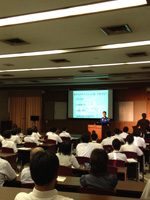
Yui speaks to the students at the camp (Credit: JAXA)
On August 9, Yui participated as an instructor in a camp, which is intended to foster students' creativity and held annually at Fujiyoshida city in Yamanashi prefecture. Yui used a slide projector and video introducing the experiences gained in his former career and from the time when he first became an astronaut to the present. He discussed how "having a clear dream and perceiving the reality to make the dream come true is indispensable", "by understanding the gap between the dream and reality, you will know how to fill it", emphasizing that developing the right thinking ability is key to making a dream come true.
On August 11, Yui appeared at the 80th JAXA Town Meeting and exchanged opinions with the participants concerning the ISS utilization. Subsequently, on August 12, Yui delivered a lecture at Saku City in Nagano Prefecture.
New Astronauts at the Front-Line

In August, I was home for PR activities in Japan. As staying in Houston allowed me few opportunities to meet you, I was pleased to see many people during this stay, which taught me many things. In particular, what I realized more than ever was the need to convey the crucial importance of dreams to people.
It dates back to the time right after I was selected as an astronaut candidate in 2009. Given the precious opportunity to become an astronaut, many people commented, saying things like what a dream life I was chosen to have. In response, I just nodded repeatedly, without actually realizing myself "what a dream life meant". This is because I know that becoming an astronaut includes a severe reality which the sparkling image of a 'dream' cannot gloss over. I remember that the JAXA selection test included attempts to bring home the severe reality of space to applicants. (For example, an explanation of the effects on human bodies caused by space radiation, viewing of astronauts' drills in Houston, etc.)
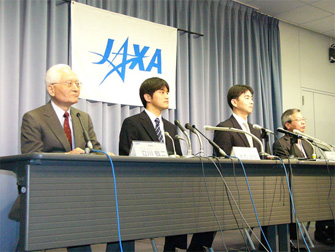
I got nervous at this, my first ever press conference, with many thoughts mixed up... I am sure this was a major turning point in my life.
To tell the truth, I remember that I was quite astonished to learn about the harsh missions assigned to astronauts. Even with my vocational experience as a test pilot in the Japan Self-Defense Forces, which is one of the toughest posts there, I was not confident I could acquire sufficient ability required to perform a mission as an astronaut. This is why I felt more bewildered than happy when informed that I had been selected as an astronaut candidate:"It must be tough to be an astronaut...", honestly I wondered whether such important and demanding work was deserving of the simple term 'dream'.
Sorting out my thoughts, I found that generally speaking, 'one's dream' refers to 'an objective in one's life', which elucidated people's opinion on the term 'dream'. (Sorry! So simple, but I was unaware. My poor Japanese still annoys me � LOL.)
To me, the term 'dream' seems applicable to a range of diverse vocations, including astronauts. I hope that all those fortunate enough to enter such professions work proudly and recognize the significance of their work. Furthermore, I also hope that students having passed high school or university entrance exams and experiencing the joy of their 'dreams' becoming reality, study hard and remain aware of the responsibility accompanying their 'dreams'. I think this also applies to job hunting as well. Personally, if I were a human resource manager, I would employ students who studied hard with passion and who understood the responsibility in their dream work...
Another aspect I would like to mention about 'dreams' is the mindset applied toward personal dreams. Although lacking any noble motive when entering the National Defense Academy, I developed pride in my job as I continued working there. Quite honestly, I had no intention to change my work for my life and prioritize a life devoted to a single profession, which is why I was torn between my values and going into another path leaving my responsibility behind. Besides, I was thinking of declining the offer to become an astronaut, if selected, since many oppose any change in direction after confirming the trend of public opinion. To the best of my knowledge, however, there was no strong opposition, which meant I could work for JAXA as an astronaut candidate. At that moment, I convinced myself, "Both working for space development and for the Self-Defense Forces target human happiness. I will simply change and dedicate myself to another path for the happiness of Japanese who have invested in me." To proudly say that I made the right decision, I must contribute to this country through successful outcomes in the field of space, surpassing those which would be acquired if I kept working for the Forces as a minimum! I believe that people who change jobs in pursuing their dreams should contribute more to society than before.
So when I use the word 'dream' in my speeches and interviews, I hope that you will understand that it refers to 'an objective in life'.
Now let me conclude. What I would like to tell you is that 'the significance of your dreams' means 'the significance of the objectives in your life'. Ultimately, it compels you to seriously consider the meaning of life. Although you may wonder whether to trust these words from a person who has not seen much of the world yet, like myself, if many people considered this, it would certainly make the world, including Japan, a more comfortable place to live, and it is never too late for you to consider your dreams! In your own time, think of your own 'dreams', the 'objectives in] your life', and your 'way of life' for our brighter future...
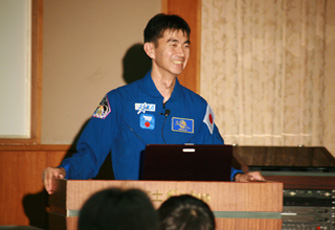
I am keen to discuss the significance of 'dreams' and 'objectives in life' with self-awareness of my responsibility as an astronaut. My wife often says, "You talk like a preacher!" LOL
* Image presented by JAXA

Now I regret one choice I made as a student.
This was my choice of second language at university.
When entering a university in Japan, students must choose a second language, which is crucial, because it then governs the rest of your classes to take in the first year. Groundlessly I selected German, just for the irresponsible reason that 'it looked cool.'
15 years have since elapsed... now I find myself feeling so bitter about my lackadaisical attitude at the time: why did I not choose Russian?!
But quite rightly, it is no use crying over spilt milk.
Today every astronaut targeting extended stays on the ISS has no choice but to face a tough barrier, Russian.
Since the retirement of the Space Shuttle of the U.S. in 2011, the Russian Soyuz spacecraft is the sole means of transporting astronauts between the Earth and the ISS. This means that training related to the Russian segment on the ISS as well as Soyuz takes place in Russia, and constantly in Russian.
In understanding what the instructors explain, there is a significant difference between perceiving the instructions in person and through an interpreter, which is allowed. That is why astronauts study hard to master Russian.
Here, at the NASA Johnson Space Center, many instructors teach us Russian. Many are Russians brought up in Russian-speaking regions, while others are Americans in the U.S.
Astronauts are provided with 2 or 3 Russian classes a week, each of which is generally one-on-one and lasting one and a half to 2 hours.
The type of class depends on the teacher. My teacher gives me lessons in parallel including grammatical drills, conversation practice, watching Russian documentaries, and newspaper reading.
Nearly 2 years have passed since I started learning Russian.
It is hard to start something totally new from the very beginning in any field: the same applies to learning Russian. I was so confused when I started, though I am still struggling...
Now let me cite one example.
Russian has nouns with grammatical genders, which is also a grammatical concept existing in other languages such as German, but not Japanese.
Nouns, e.g. book, milk, school, textbook, whatever, are all categorized into three types: masculine, neuter, and feminine. Though some are intelligibly classified, e.g. boy as masculine, schoolgirl as feminine, others seem to be random: magazine is masculine while newspaper is feminine, sugar is masculine and salt is feminine.
These grammatical genders often affect the forms of the adjectives qualifying them. In Japanese, 'Ookii' (meaning 'big') does not change its form dependent on the noun type. In Russian, however, adjectival forms change dependent on the noun types which they qualify. When you say "the building (neuter) is big" and "the car (feminine) is big", you have to modify the adjectival form of the adjective "big" slightly.
In Russian, such changes in word forms, maybe technically referred to as declensions, are so complicated that it often takes hours or more for beginners to look up the words in a dictionary.
Of course, English, a language familiar to Japanese, also has some declensions but compared to Russian, they are like chalk and cheese. I think that its simplicity may be one of the factors of its global prevalence. Or, did it become as simple as now in the process of gaining prevalence?
As I said before, starting something totally new from the very beginning is tough, despite the joy and pleasure in learning something new. I was really pleased when I could communicate with local people in Russian during my first visit to Russia recently.
I do hope to keep learning this intelligible language Russian enjoyably and successfully.
Incidentally, when I complained to an American astronaut similarly tackling Russian, "Russian is an incredibly complicated and intangible language, isn't it?", he said, "What are you talking about? You never forget Japanese is over our heads. Kanji are unbelievable. I can't imagine how many you have on Earth!"
...Right!

Hello, everyone. I am a rookie astronaut, Norishige Kanai.
Thank you for all your comments, which were recently compiled and sent to me by the staff member in charge of this column. Your warm encouragement inspired me to think, "I will strive hard in training every day!", "I will continue this column." Let me express my gratitude to each of you who kindly sent me comments and read my clumsy reports.
I would also be grateful if you could send me any comments and opinions, such as requests letting me know what you want me to write, questions on the training and work of astronauts, or exhortations e.g. "Pull yourself together!" Though I am afraid that I may be unable to respond to each of your questions and requests individually, I am sure your comments will encourage me to keep giving you more intriguing insights into the activities of JAXA and the work of astronauts through many opportunities, including lectures as well as this column.
Today, let me briefly report on the training conducted in Japan in August.
The training took place at the Tsukuba Space Center in Tsukuba city, Ibaraki Pref. in Japan, which is the only global site capable of training astronauts for the Japanese Experiment Module "Kibo", part of the ISS. All astronauts, including Japanese, scheduled to participate in missions on the ISS must train here.
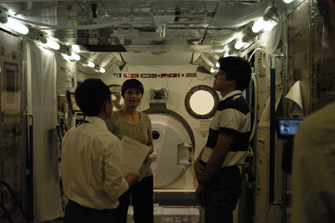
Image presented by JAXA
Comprising many classes, drills and finally exams within such a short period, the training at the center kept astronauts busy and working hard. Nevertheless, overseas astronauts look forward to 'coming to Japan for training'.
This time, I trained alongside Samantha Cristoforetti, an astronaut from Italy and a training partner who fully enjoyed her stay in Japan, travelling to Kyoto, climbing Mt. Fuji, etc. on weekends during the training session.
Now let me move on to another topic. The Japan Experiment Module "Kibo", part of the ISS operated by Japan (usually referred to as "module"), is under the 24-hour control of the Control Center in the Tsukuba Space Center, with electricity and air supplied by a module operated by the U.S.
Mainly consisting of three parts, a Pressurized Module (PM), Experiment Logistics Module Pressurized Section (ELM-PS) and an Exposed Facility (EF), "Kibo" has unique functions on the ISS, such as its original robotic arms and an airlock for taking goods into and out of space.
I was not fully aware of how great "Kibo" was, right after being selected as an astronaut candidate in 2009. Studying "Kibo" anew, however, after learning about the whole ISS, gave me a whole new insight into Japan's unique ideas and new technological challenges realized, while also leaving me utterly astonished by the enthusiasm and ingenuity of the engineers behind its construction.
"Technological superpower Japan" � today this phrase sounds old fashioned and might only apply in the past tense due to neighboring countries such as China and Korea, which are currently increasing their technological strength. However, working away from Japan, every day I can vividly feel other countries' strong trust in Japan's technology as a project partner.
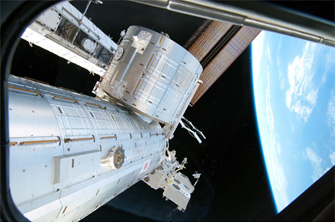
Image presented by JAXA/NASA
"Kibo" is the largest module on the ISS. The newest and cleanest, with the least noise (off topic, I believe this is a Japanese feature), it seems that "Kibo" is also often used as a venue for press conferences and education programs, even when no Japanese astronauts stay on the ISS. I am really proud as a Japanese when I see the inside of "Kibo" used by foreign countries as well as Japan on the NASA TV programs independently broadcast by NASA and sometimes on news programs broadcast throughout the U.S.
Furthermore, we should also note the active role played by Japan's ground controllers. They have constantly observed "Kibo" from the ground for over 4 years since the Experiment Logistics Module Pressurized Section (ELM-PS) was installed onto the ISS since the first step by Astronaut Takao Doi in 2008.
No damages or malfunctions endangering humans should be allowed on the ISS where astronauts regularly stay. In a spacecraft uniquely constructed and operated by Japan as a historical first (more precisely, it is part of the ISS, which can also be considered a huge spacecraft, whereby modules such as Japan's "Kibo" and Europe's "Columbus" have their own specific functions as small space stations.), unexpected phenomena and malfunctions may occur at any time. Nevertheless, the fact that it has continued to operate without significant problems is largely thanks to the professionalism of the JAXA ground controllers, endorsed by their rugged training as well as highly accurate designing and manufacturing of the module from the development stage.
It is the training instructors at the Tsukuba Space Center who provide rugged training for the ground controllers, representing Japan's pride and astronauts who come for training from all over the world.
Just like the training which I had as an astronaut candidate at NASA, given by the best American engineers from all over the U.S., at the Tsukuba Space Center, Japanese instructors trained us with knowledge and enthusiasm every bit the equal of the American instructors. While always smiling and kind, never reprimanding candidates who did not do well, they firmly insisted on candidates performing what they were required to do. The training was seemingly characterized by Japanese sincerity and scrupulosity. (Now I am sure you will understand that such training given by such enthusiastic instructors allowed me to successfully pass all the exams and qualify as a "Kibo operator".)
Reading this, you may think, "No, no, that is too complimentary to Japanese": but it is no exaggeration, merely my honest impression and what I clearly recognized through working under NASA away from Japan.
In the U.S., Americans work with us, as much with enhanced trust in their partners Japan and Europe as pride in space development by their own country, which they undoubtedly have.
I heard that two decades ago, Americans took no account of Japan's space development when Japan sent astronauts to space on board the Space Shuttle for the first time. I believe that the present cooperative framework of the U.S. and Japan is significantly thanks to continued years of efforts by dedicated engineers, researchers, and astronauts of JAXA.
Accordingly, the training in Japan meant I did not take the strong trust and high evaluation of the U.S. toward Japan for granted, but made me ponder, "What must I do to cherish and continue it?"












